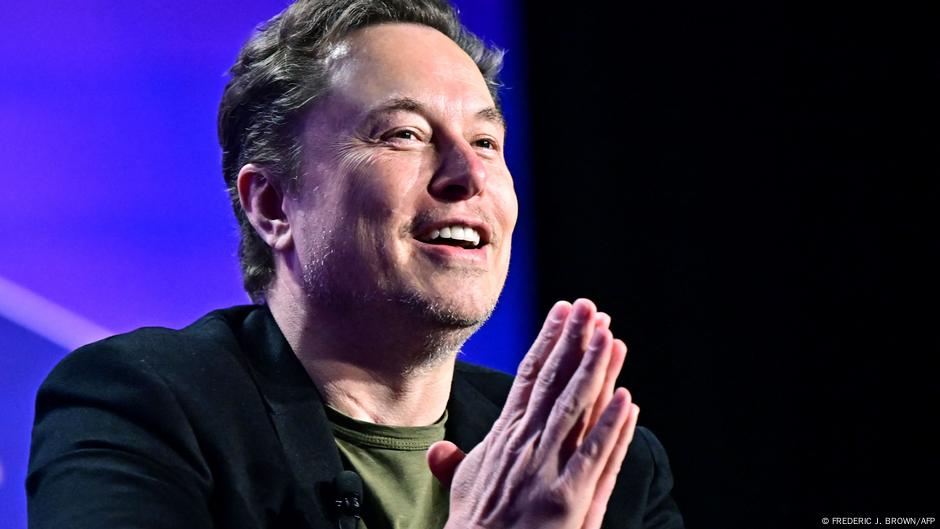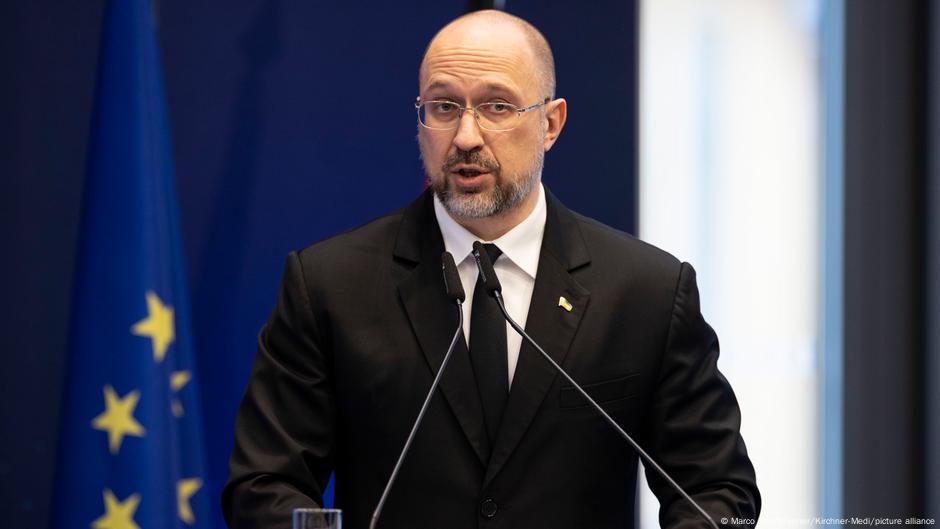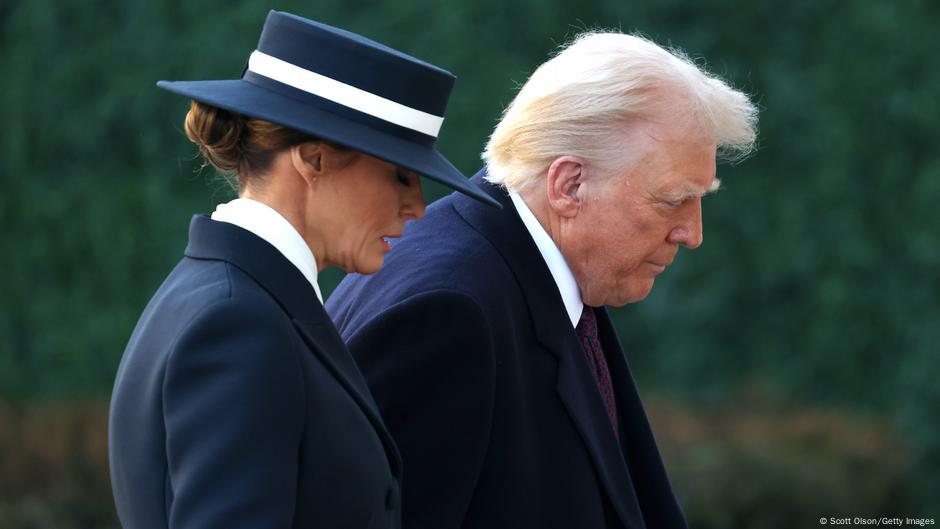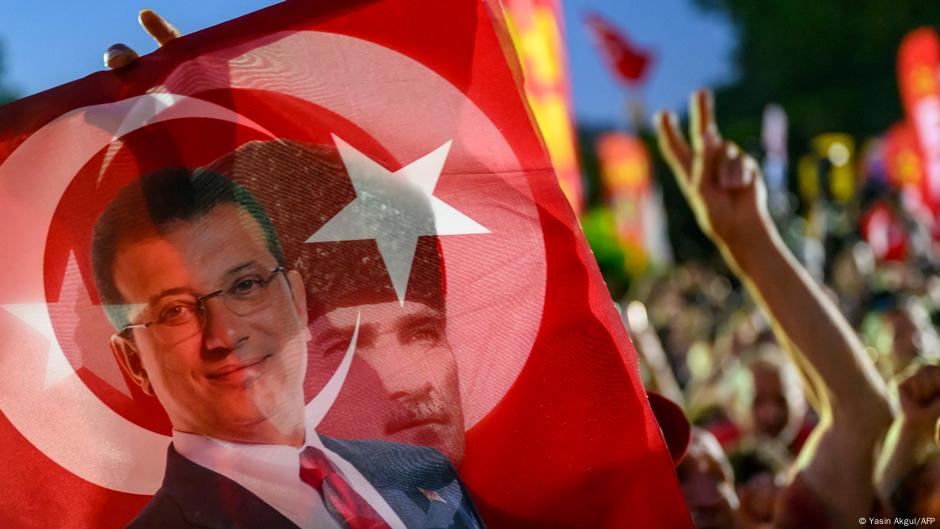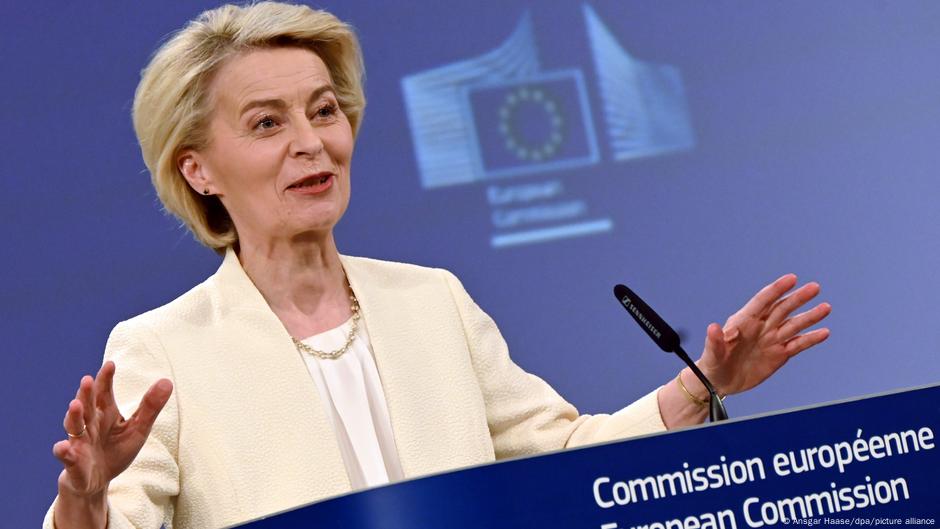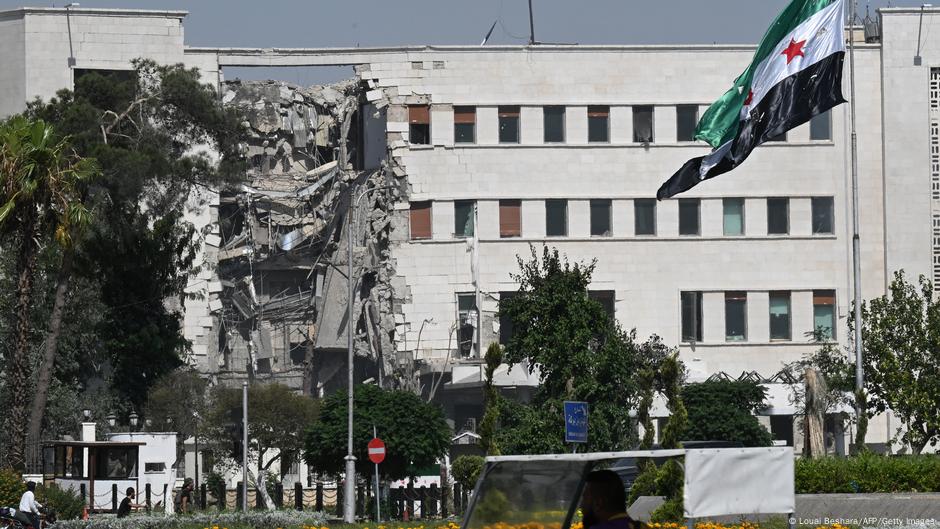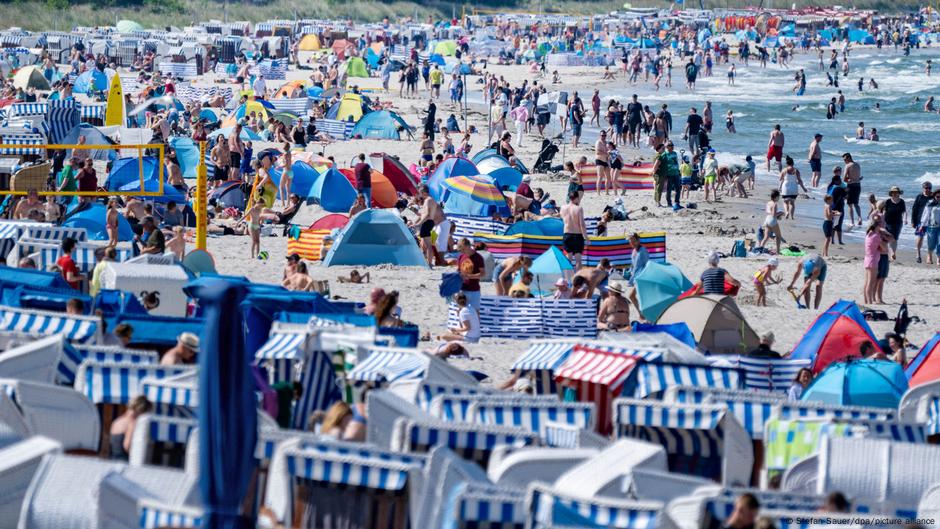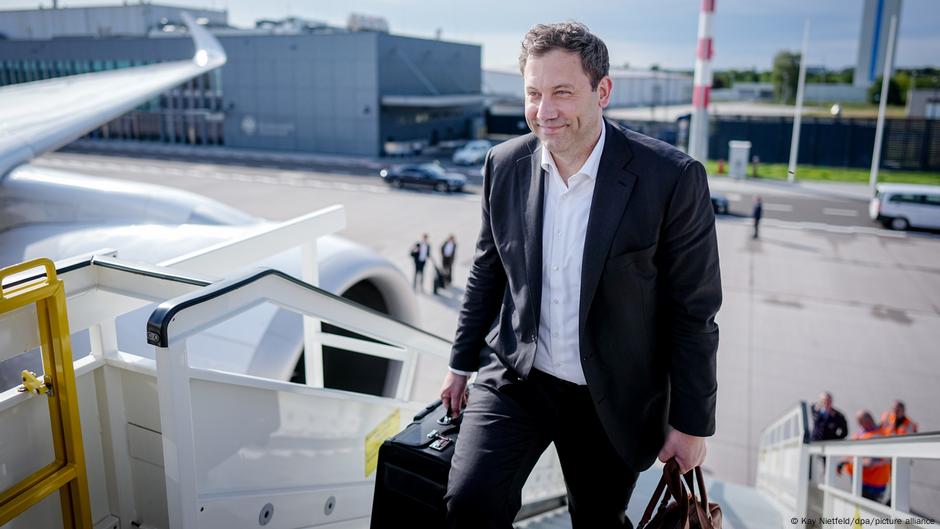Critics have been arguing that families elsewhere have been stuck with peak prices while Bavaria and Baden-Württemberg enjoy their late breaks.
Leaders in the south have been insisting they won’t budge, saying the traditional rhythm has been part of their identity for decades.
Keep up-to-date here with this and the other stories making the news in Germany on Wednesday, July 16.
Skip next section German man drowns off coast of northern France07/16/2025July 16, 2025
German man drowns off coast of northern France
A 47-year-old German man has drowned off the northern coast of France after becoming trapped by the rising tide in the English Channel, local rescue services confirmed on Wednesday.
According to the French fire brigade, the man was trapped on a sandbank near the small town of Audresselles, between Calais and Boulogne-sur-Mer, along with seven other people, including several children.
By the time rescue crews reached the group, the man had already suffered a cardiac arrest and could not be resuscitated.
A nine-year-old girl and a 13-year-old boy, also German, were taken to hospital in Boulogne-sur-Mer having inhaled water but still conscious.
Rescue crews were continuing to search the area by boat on Wednesday evening to ensure that nobody had been left behind.
Maritime authorities in northern France regularly warn visitors to pay attention to the tides, saying: “It only takes a few minutes to be taken by surprise by a rising tide.”
https://p.dw.com/p/4xZwKSkip next section Germany has ‘neglected relationships’ with global south, says Vice-Chancellor07/16/2025July 16, 2025
Germany has ‘neglected relationships’ with global south, says Vice-Chancellor
Kieran Burke Editor
Ahead of a meeting of G20 finance ministers in Durban, South Africa, on Thursday, German Finance Minister and Vice-Chancellor Lars Klingbeil has stressed the need for Berlin to work on its relationships with the global south.
“Given trade conflicts and global insecurities, we must further our existing partnerships and develop new ones,” said Klingbeil, the leader of the Social Democratic Party (SPD), the junior partner in Germany’s coalition government.
“Our partners in the global south share in particular an interest in reliable trade relations and the rule of international law,” he said on Wednesday. “Yet Germany has neglected these relationships for too long while Russia and China have increased their influence. We have to change this.”
In order to achieve this, Klingbeil wants to involve more African countries in the “Compact with Africa” initiative, which was launched under the German presidency of the G20 in 2017, as well as greater private investment in African states.
“The interest in greater cooperation with Germany and Europe is great,” he said. “But it requires hard work, respect and concrete offers.”
During his visit to Durban, Klingbeil is set to visit South Africa’s biggest harbor and hold meetings with German businesses in the country.
South Africa currently holds the G20’s rotating presidency and will host the G20 summit in Johannesburg in November.
https://p.dw.com/p/4xZvVSkip next section AfD closes in on conservatives as far right gains in new poll07/16/2025July 16, 2025
AfD closes in on conservatives as far right gains in new poll
Germany’s far-right Alternative for Germany (AfD) has narrowed the gap with the conservative CDU/CSU bloc, according to a new YouGov poll.
The AfD gained two points since last month to hit 25% support, while the CDU and its Bavarian sister party, the CSU, slipped one point to 27%.
If an election were held this Sunday, the poll showed the centre-left Social Democrats (SPD) stuck at 14%. The environmentalist Greens dipped to 11%, down one point, while the socialist Left Party rose two points to 10%.
Support for Sahra Wagenknecht’s new populist BSW party held steady at 5%. The business-focused Free Democrats stayed at just 3%.
The survey was conducted between July 11 and 14, just after a Bundestag vote to appoint constitutional court judges collapsed amid a coalition rift between the CDU/CSU and SPD.
YouGov noted it was unclear whether the failed vote influenced the results, pointing out that political events often take time to show up in polls.
The poll surveyed 1,820 eligible voters from a total sample of 2,192 participants.
Security loopholes in Germany’s parliament spark concern
To view this video please enable JavaScript, and consider upgrading to a web browser that supports HTML5 video
https://p.dw.com/p/4xXlrSkip next section Germany moves to boost pandemic readiness07/16/2025July 16, 2025
Germany moves to boost pandemic readiness
Richard Connor
Germany is set to tighten its pandemic response by putting updated World Health Organization (WHO) rules into national law. The Cabinet on Wednesday approved draft legislation that will implement recent changes to the WHO’s International Health Regulations.
The new rules, agreed by WHO member states in 2024, aim to speed up information-sharing during outbreaks and strengthen lab and healthcare capacity worldwide.
“The global community must be better prepared for health crises,” Health Minister Nina Warken said. “The coronavirus pandemic has taught us this.”
What WHO measures does the German Cabinet want to implement?
Key measures include requiring countries to report potential international health emergencies to the WHO and to maintain “core capacities” like lab diagnostics and risk communication.
The Health Ministry stressed that the law won’t limit Germany’s sovereignty or its ability to impose domestic protective measures.
The draft will now go to parliament for final approval.
https://p.dw.com/p/4xXjTSkip next section Environmental group lauches citizen-action project on air pollution07/16/2025July 16, 2025
Environmental group lauches citizen-action project on air pollution
Timothy Jones
The organization Environmental Action Germany (DUH) has called for help in identifying sites where the pollutant nitrogen dioxide (NO2) could be present in the air in dangerous amounts.
It launched a project on Wednesday during which all German residents can send in their suggestions for where measurements should be taken. The project runs until August 24.
Participants will receive two small plastic tubes that they can place at the sites to help measure the degree of pollution, with the results evaluated in a laboratory in October.
The DUH has criticized the fact that there are fewer than 300 measuring stations for nitrogen dioxide near locations with traffic and wants to create 500 to 600 more with its project.
What is nitrogen dioxide?
Nitrogen dioxide, a gas emitted by diesel vehicles in particular, has been found to cause eye irritation and damage to mucous membranes in the respiratory tract.
High concentrations have been shown to contribute to bronchitis and pulmonary edema, while studies demonstrate a connection between high exposure to the gas and cardiovascular disease.
The DUH says that 28,000 people per year die of illnesses resulting from high exposure to NO2.
https://p.dw.com/p/4xXJnSkip next section More people in Germany living alone07/16/2025July 16, 2025
More people in Germany living alone
In Germany, 17 million people — or 20.6% of the population — now live alone in their own homes, according to new figures from the country’s federal statistics office, known as Destatis.
Twenty years ago, that share was just 17.1% (14 million people).
Older people are most likely to live alone: 34% of those over 65 do so, and among those aged 85 and older, the share jumps to 56%. But young adults between 25 and 34 also stand out, with 28% living alone — well above average. Women live alone slightly more often than men (21.2% versus 20%).
Compared to the EU average of 16.2%, Germany’s share of solo households is high — only Lithuania, Finland, Denmark, Estonia and Sweden have higher rates. The lowest shares are found in Slovakia, Ireland and Poland.
Single-person households are already the most common household type in Germany, making up 41.6% of all households. According to forecasts, this share could exceed 45% by 2040.
Loneliness hurts — and that’s hardwired in our brain
To view this video please enable JavaScript, and consider upgrading to a web browser that supports HTML5 video
Living alone can come with downsides: one in four people living alone says they often feel lonely — much higher than the 16.3% average for the general population aged ten and older. Loneliness is most common among those under 30 who live alone: nearly 36% of them report feeling lonely frequently. Among solo households aged 65 and older, that share drops to just 17.6%.
Citește mai multe știri pe top10stiri.ro
Single people are also more at risk of poverty. In 2023, 29% of people living alone were considered at risk of poverty — nearly twice as high as the rate for the total population.
https://p.dw.com/p/4xWd5Skip next section Women’s share on German company boards slips slightly: study07/16/2025July 16, 2025
Women’s share on German company boards slips slightly: study
Women hold just under a fifth of management board positions on German-listed companies, according to a study by the Fidar groupImage: Annette Riedl/dpa/picture alliance
The proportion of women who sit on supervisory boards at German-listed companies has edged down slightly, according to a new study by the group Women in Supervisory Boards (Fidar).
Women held 37% of seats at 179 listed firms, down from 37.3% last year. A quarter of companies had an equal number of men and women on their supervisory boards.
The picture at the executive level improved a little, with women now holding 19.9% of management board positions — up from 19.3% a year earlier.
The data covers companies on Germany’s DAX indices plus other publicly traded and co-determined firms.
Germany introduced a binding 30% quota for women on supervisory boards in 2016.
Large listed firms with boards of more than three members must also have at least one woman and one man to meet gender participation rules introduced in mid-2022.
https://p.dw.com/p/4xWSfSkip next section China drops sanctions on German lawmaker ahead of EU summit07/16/2025July 16, 2025
China drops sanctions on German lawmaker ahead of EU summit
China has removed its sanctions against German Green Party politician Reinhard Bütikofer after blacklisting him in retaliation for EU measures over alleged human rights abuses in Xinjiang, EU officials said Friday.
The measure, seen as part of Beijing’s push to reopen dialogue with the European Parliament, comes days ahead of an EU-China summit in Beijing.
Bütikofer chaired the parliament’s China delegation until this year.
Bütikofer is a member of the enviornmentalist Greens, which is the second-largest opposition party in the German BundestagImage: picture alliance / dts-Agentur
In response to the news, the politician slammed China’s approach as “arbitrary” and lacking any real political coherence.
He pointed out that other EU targets — including Berlin’s Mercator Institute for China Studies — remain blacklisted.
Beijing imposed the bans in 2021 after the EU hit Chinese officials with asset freezes and travel bans over the treatment of the Muslim Uighur minority in Xinjiang. The sanctions barred Bütikofer and others from entering China or doing business there.
https://p.dw.com/p/4xWSgSkip next section German states push for fairer summer break rotation as Bavaria digs in07/16/2025July 16, 2025
German states push for fairer summer break rotation as Bavaria digs in
Calls for a shake-up of Germany’s summer holiday timetable are growing louder, as more states push for an end to what they see as an unfair advantage for Bavaria and Baden-Württemberg — the only two states that always start their school break last.
While most of Germany’s states rotate their summer holiday slots each year to ease travel chaos and spread demand for holiday accommodation, the two southern states keep their late break thanks to their traditional Catholic Pentecost holidays.
The Standing Conference of State Ministers of Education says the special rule ensures enough learning and exam time between Pentecost and the summer break.
But critics argue that families in other states are stuck with peak season prices and packed roads, while parents in the south can avoid the rush by taking advantage of the early summer Pentecost period.
“This rigid system is no longer fair,” said the western state of North Rhine-Westphalia’s Education Minister Dorothee Feller.
Rhineland-Palatinate’s Education Minister Sven Teuber echoed her call, telling the German newspaper Bild: “Summer holidays are not a privilege for a few states. We need constructive solutions, including from those that have shown little flexibility so far.”
“State uprising against extra sausage for Bavaria,” was the newspaper’s online headline, using a German term for preferential treatment.
Bavaria’s premier is Markus Söder, who also heads the conservative Christian Social Union (CSU)Image: Revierfoto/dpa/picture alliance
Germany’s holiday calendar is based on the 1964 Hamburg Agreement, which fixes the total number of school holiday days at 75 per year and sets a framework for when the summer break can start — depending on Easter and Pentecost dates.
Bavaria’s Premier Markus Söder of the Christian Social Union (CSU) dismissed the calls for change. “We have our holiday rhythm — it’s part of Bavaria’s DNA,” he said. Baden-Württemberg also shows no sign of budging, despite occasional grumbling that its late break sometimes brings chilly, autumn-like weather by early September.
What does the average German do on vacation?
To view this video please enable JavaScript, and consider upgrading to a web browser that supports HTML5 video
https://p.dw.com/p/4xWWrSkip next section Welcome to our coverage07/16/2025July 16, 2025
Welcome to our coverage
Richard Connor with AP, AFP, dpa, Reuters | Saim Dušan Inayatullah Editor
Welcome to our coverage from DW’s newsroom in a cloudy but warm Bonn in the state of North Rhine-Westphalia.
You join us as a row brews over Germany’s rotating summer holiday timetable.
North Rhine-Westphalia and other states in Germany complain of unfair treatment when it comes to the way that holiday dates are staggered.
They want a change to a rota aimed at easing travel chaos, saying the southern states of Bavaria and Baden-Württemberg have been keeping an unfair late-slot perk.
Other states say this is a headache for families elsewhere who have to juggle peak prices and childcare. However, the Catholic south is sticking firmly to a tradition rooted in the religious holiday of Pentecost.
Stay tuned here for this and other news from Germany.
https://p.dw.com/p/4xWauMatt Ford Reporter for DW News and Fact CheckRichard Connor Reporting on stories from around the world, with a particular focus on Europe — especially Germany.Send us your feedback
Sursa: DW
